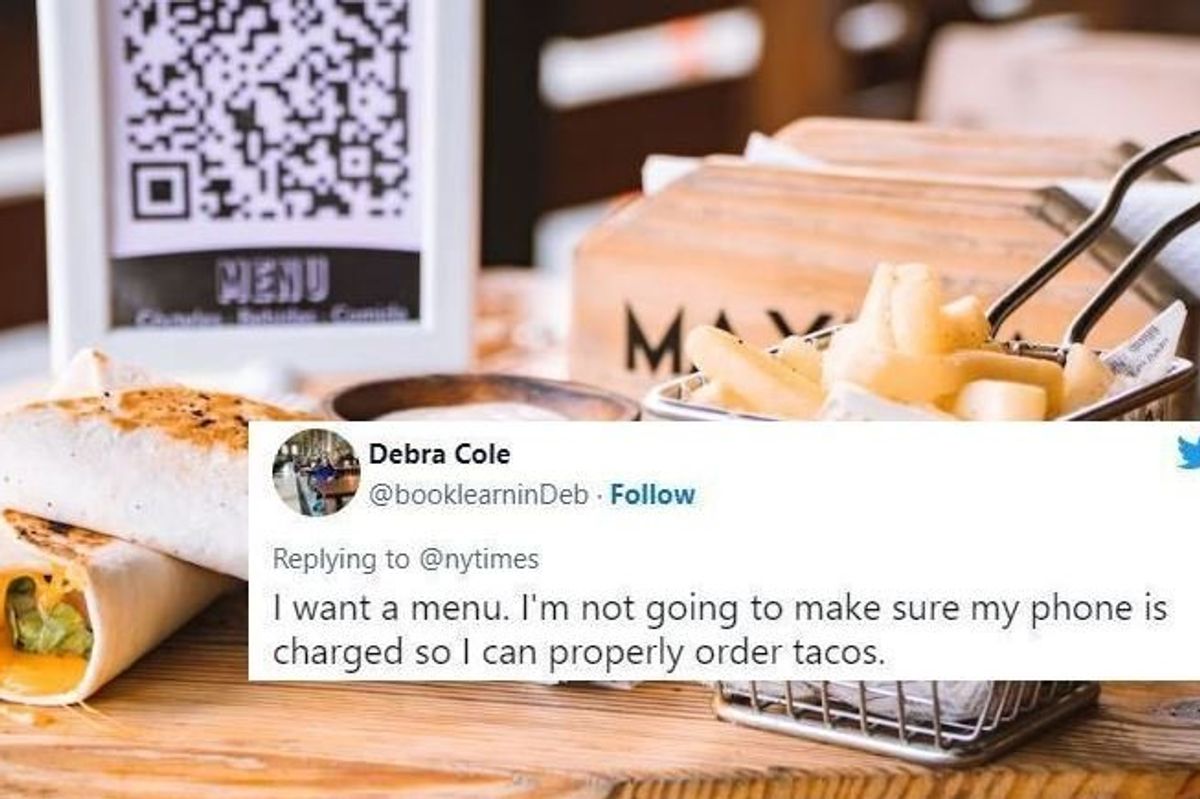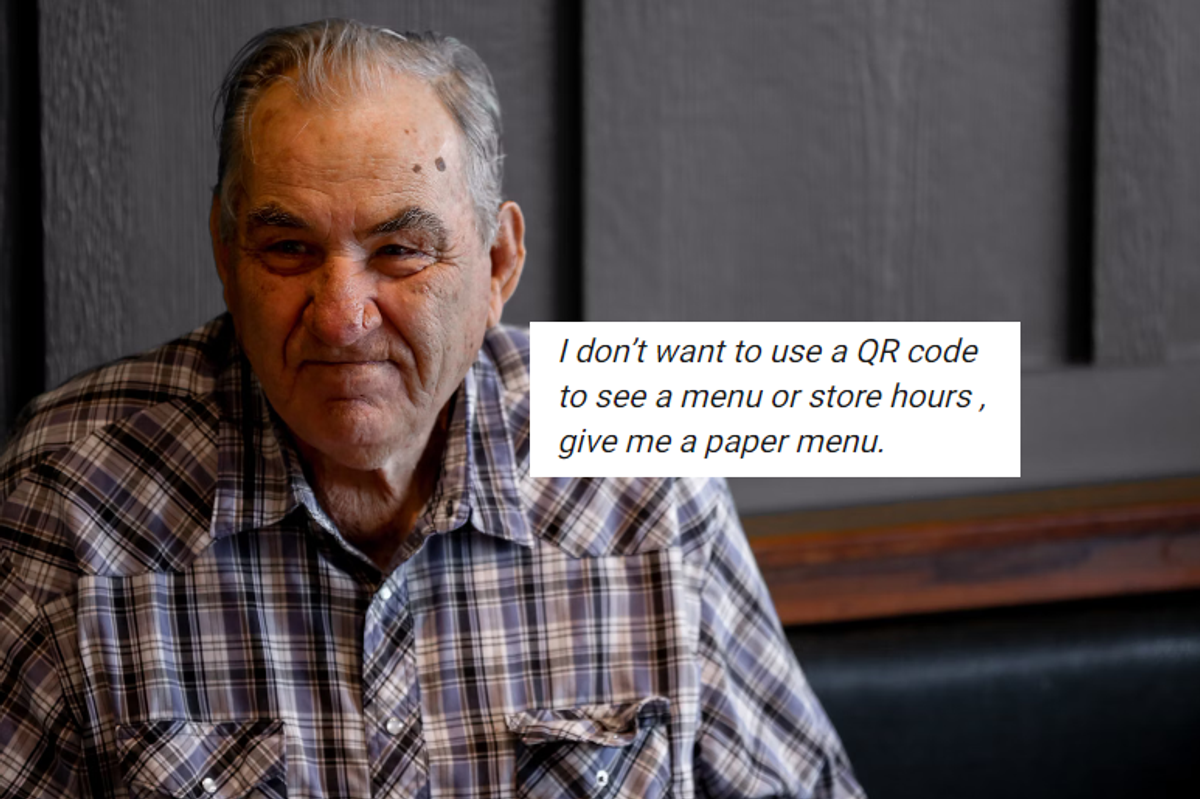Restaurants and their customers are happily saying goodbye to QR code menus
It seemed like they'd be around forever.

A delicious-looking Mexican meal with a QR code menu
There’s a concept known as “app creep,” where every aspect of our lives is slowly becoming tethered to our smartphones in one way or another. If you spend a day at Disneyland, you must download an app to reserve your spot in line for certain attractions. Many kids’ toys now require an app to operate them or for you to download one to get the instructions. And good luck getting into a concert without transferring your tickets from your Ticketmaster app to your iPhone wallet.
Before the pandemic, we could all go to restaurants to relax and have face-to-face conversations without any help from technology. But after COVID-19 arrived, many restaurants replaced menus with a QR code on a sticker in the middle of the table.
Time previously spent poring over a menu was replaced with people staring at their phones, sometimes squinting at the text. What about a second cocktail? How about dessert? Time to fish the iPhone out of your purse or pocket to see what’s available and hope the site loads.
Even though the QR code menu didn’t ruin the entire dining experience, it’s still been seen as an infringement on the normally tech-free space by the vast majority of people.
According to CNN, a recent survey by Technomic found that about 88% of respondents preferred paper menus to digital QR codes, and 66% agreed or strongly agreed that they didn’t like QR codes because they involve pulling out your phone as soon as you sit at the table.
Fifty-five percent of those surveyed felt that QR codes were “hard to read” and browse through.
So it appears that, in a rare reversal of app creep, people are pushing back on digital intrusion and demanding to see an old-school menu at their tables. A new report by MustHaveMenus, a menu management and printing platform with about 7,000 customers across the United States, shows that restaurant QR code use is declining.
According to a report in The New York Times, “From April 1 to May 16 of this year, the total number of [QR] scans has dropped by about 27 percent compared with the same period in 2021.” Mark Plumlee, the senior content manager at MustHaveMenus, added that “Fewer restaurants are creating new QR menus” and that “75 percent of their existing QR codes are essentially dormant.”
The news that QR codes are on the way out inspired a fun conversation on Twitter.
Paper menus are better, however I reserve the most respect for the true old school establishments that still have their entire menu scrawled onto a chalk board hanging in the corner
— Chuck Brotton (@CMB1969) May 23, 2023
I saw a storefront with a QR code "store hours". Like... just post the store hours...
— Student Loan Memes (@EricSFong) May 23, 2023
I want a menu. I'm not going to make sure my phone is charged so I can properly order tacos.
— Debra Cole (@booklearninDeb) May 23, 2023
Yes, it’s annoying, pretentious, and I demand an actual menu so I can pretend I know how to read
— JackSmith (@jackmarlui1918) May 23, 2023
Agreed. I’m at a restaurant to NOT use my dumb phone for a while.
— Suzie McQ (@McQzan) May 23, 2023
The world was drastically turned upside down during COVID-19, and now we are all working out ways to get it back to a new normal. The upside is that some significant advancements came out of the pandemic that people like for the most part and have made the world a better place, such as curbside pickup, cocktails-to-go, mRNA vaccines, telehealth, working from home, direct cash payments, free school meals, eating on sidewalks and streets, voting by mail and wearing a mask when you should be considerate of others’ health.
The world has spoken, and although some COVID-19 changes are here to stay, it’s time to make the QR code menu a thing of the past. Oh yeah, and while we’re at it, can we scrape the “6 Feet Distance” stickers off the supermarket floor already? They’re starting to look a little worn.






 A woman is getting angry at her coworker.via
A woman is getting angry at her coworker.via  A man with tape over his mouth.via
A man with tape over his mouth.via  A husband is angry with his wife. via
A husband is angry with his wife. via 
 Some Boomer grandparents are being called out for "gramnesia".
Some Boomer grandparents are being called out for "gramnesia".

 A woman gets a tattoo.
A woman gets a tattoo. Boy playing on the computer.
Boy playing on the computer.
 Grumpy boomers aren't wrong about everything. Photo by
Grumpy boomers aren't wrong about everything. Photo by  Even the young people can't stand QR codes. Photo by
Even the young people can't stand QR codes. Photo by  Everything, even fast food, has gotten out of control expensive. Photo by
Everything, even fast food, has gotten out of control expensive. Photo by